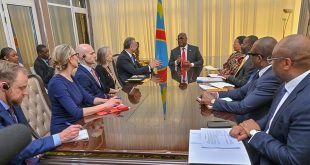Thus when an accusation of financial impropriety was raised against him, 1 was keen to hear his Side of tile story. He gave a sound explanation. Without calling him to testify before her commission, Ssebutinde, with characteristic gusto, “rejected” Rwakakoko’s explanation out of hand. Doesn’t Rwakakoko deserve the benefit of doubt from the lady justice! or the right to be heard? During; the police probe. Karim was accused of many things including murder; Karim applied to be allowed to testify. Sebutinde refused, saying she was not investigating him. Karim complained that so much was being said against him, that bad publicity was hurting his business, that he just wanted an opportunity to defend his name before the same commission. Ssebutinde turned him down. Today, Ssebutinde says: “He is not a bona fide- investor; he is a fraudster!” This is a justice of the High Court of Uganda pronouncing herself about a man she has never allowed before any of her commissions.

Karim is not an angel. But doesn’t he deserve fairness from a judge’! One of the principles of natural justice is that you should not be a judge and a prosecutor in the same case. Ssebutinde plays both roles in the commission. The other is that you should not make judgement of someone without hearing his or her side of the story Although the law on commissions of inquiry allows the chair to adopt his or her own style of inquiry, we expect better when the chair is a judge because we attach the virtues of impartiality and fairness to them.
I was listening to Ssebutmde question the URA Deputy Director General, Steven Akabway and it felt like she was talking to her houseboy She even yelled at Akabway, questioning his grasp of the English language and telling him that “if you don’t understand English I can interpret for you.”
Akabway is a highly respected public servant and to treat him with the kind of contempt as Sebutinde did was, to me, rude. Justice Ogola chaired the commission of inquiry into the banking industry, and everyone who appeared there felt listened to.
Indeed, some of the big stories from that commission reflect the kind of attitude that we need to guard against. Take the case of URA commissioner for administration. Jack Bigirwa. He was accused by Ssebutinde of building a “large mansion” in Sheema Bushenyi, and putting up a large coffee estate on his land, all courtesy of corruption in URA. Bigirwa built the said house in 1984 and the farm as far back as 1980. He has been slowly improving on both over the last 22 years Bigirwa is one of this country’s largest coffee farmers and makes more money selling seedlings. He chairs the Uganda Coffee Farmers’ Association and sits on the board of Uganda Coffee Development Authority (UCDA). He is also a successful fish farmer with numerous ponds at his farm and makes good money selling fish. I am not saying that Bigirwa may not have involved himself in financial impropriety at URA. l do not know. But you cannot accuse him of stealing money from URA (which was established in 1992 and he joined ill 1994) to build a mansion in Sheema which was around in 1984. ls it a crime to be rich’!
The fact that someone is perceived to be corrupt does not mean that we can manufacture evidence against him. Politicians can be excused for employing this approach as Winnie and Nathan Byanvima did in the Brig. Jim Muhwezi censure in 1998. They got a letter written in 1992 and used it as evidence of a wrong under a constitution written in 1995. They got a house on a Shs 240m unpaid mortgage and valued it at Shs. 900m and claimed it as an asset by Muhwezi. They then published these fictitious figures to whip up public sentiment and cause parliamentary mob justice.
These public rituals called “fighting corruption” only serve the regime and actually help entrench system that thrives on corruptIon Behind the charade to censure Muhwezi, for example, was President Yoweri Museveni himself seeking to sink an ally to win public favour and stabilise his regime. Winnie Byanyima would arrange night “strategy” meetings between the president and the petitioners. But they are politicians and not judges, and many politicians by their very profession are liars. I should therefore not be misunderstood to be saying that Muhwezi, Rwakakoko, Bigirwa or Karim are saints. I am saying they deserve to be heard, they should not be accused falsely, and they deserve impartiality from a judge. We should not therefore understand Ssebutinde’s style as being accidental. It is a deliberate strategy employed by the regime to appease an angry public while masking the real problems of corruption in Uganda, and at the same time serve the interests of regime survival. Ssebutinde ‘ herself may not be coached on how to handle the investigations. Rather, the regime exploits her unfair style to win public favour, that there is a war against corruption. Her role is therefore not to solve the problems of the organisations that she investigates but to dupe the public that something is being done, and in the process buy political capital for the regime.
 The Independent Uganda: You get the Truth we Pay the Price
The Independent Uganda: You get the Truth we Pay the Price



